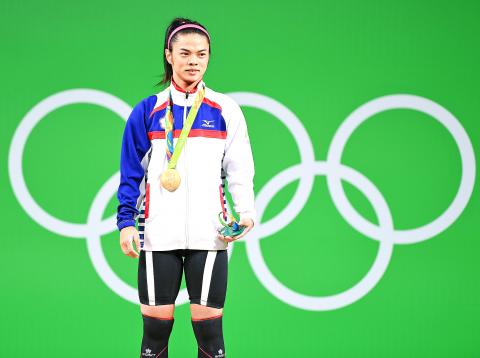Olympic double gold medalist Hsu Shu-ching (許淑淨) yesterday announced she is retiring from weightlifting and would not compete in the Asian Games in August.
In a Facebook post, the 27-year-old cited long-standing knee problems and injuries sustained during last year’s World Weightlifting Championships as the reasons for her decision, which also meant she was reluctantly giving up her dreams of competing in the 2020 Tokyo Olympics, but would turn her attention to coaching a new generation of athletes.
“I am still recovering from serious injuries sustained last year and cannot undergo training in full. After discussing the matter with my coach, my doctor, the Chinese Taipei Weightlifting Association and leaders in various organizations, I have decided to withdraw from training for the Asian Games in Jakarta and end my career as an athlete,” she said.

Photo: CNA
“Because of the government’s financial support, I will stay in the National Sports Training Center and assist Coach Tsai Wen-yee (蔡溫義) and other coaches in training young weightlifters. I will learn to be a good coach to help train more top athletes for the nation,” she said.
Hsu thanked her coach, the association, her sponsors and other parties for supporting her training so that she could do so well not only in the Olympics, but the 2014 Asian Games in Incheon, South Korea.
Government policy and support from others for weightlifting are crucial for athletes like her, Hsu said.
Hsu won a gold in the 53kg category at the 2012 London Games and the 2016 Rio De Janeiro Games, the first Taiwanese athlete to win two Olympic golds. She was scheduled to compete in the same category in Jakarta.
She said she hoped the public would continue to support her and cheer for the nation’s weightlifters in Jakarta.
Tsai, who won a bronze in the 60kg class in weightlifting at the 1984 Los Angeles Olympics, told the Central News Agency that Hsu’s retirement comes two years earlier than they had planned.
He and Hsu had originally planned that she would compete in the Tokyo Games, but he would respect her decision even though it was against his wishes, Tsai said.
Hsu tore two ligaments in her right arm during the world championships and underwent surgery after she returned to Taiwan.
Told rehabilitation would take a year, her recovery has not gone as she had expected, Hsu has said previously.

‘FORM OF PROTEST’: The German Institute Taipei said it was ‘shocked’ to see Nazi symbolism used in connection with political aims as it condemned the incident Sung Chien-liang (宋建樑), who led efforts to recall Democratic Progressive Party (DPP) Legislator Lee Kun-cheng (李坤城), was released on bail of NT$80,000 yesterday amid an outcry over a Nazi armband he wore to questioning the night before. Sung arrived at the New Taipei City District Prosecutors’ Office for questioning in a recall petition forgery case on Tuesday night wearing a red armband bearing a swastika, carrying a copy of Adolf Hitler’s Mein Kampf and giving a Nazi salute. Sung left the building at 1:15am without the armband and apparently covering the book with a coat. This is a serious international scandal and Chinese

PERSONAL DATA: The implicated KMT members allegedly compiled their petitions by copying names from party lists without the consent of the people concerned Judicial authorities searched six locations yesterday and questioned six people, including one elderly Chinese Nationalist Party (KMT) member and five KMT Youth League associates, about alleged signature forgery and fraud relating to their recall efforts against two Democratic Progressive Party (DPP) legislators. After launching a probe into alleged signature forgery and related fraud in the KMT’s recall effort, prosecutors received a number of complaints, including about one petition that had 1,748 signatures of voters whose family members said they had already passed away, and also voters who said they did not approve the use of their name, Taipei Deputy Chief Prosecutor

UNDER ATTACK: Raymond Greene said there were 412 billion malicious threats in the Asia-Pacific region in the first half of 2023, with 55 percent targeting Taiwan Taiwan not only faces military intimidation from China, but is also on the front line of global cybersecurity threats, and it is taking action to counter those attacks, President William Lai (賴清德) said yesterday. Speaking at the opening of this year’s Cybersec Expo in Taipei, the president assured foreign diplomats and exhibitors that Taiwan remained committed to strengthening its defense against cyberattacks and enhancing the resilience of its digital infrastructure. Lai referenced a report from the National Security Bureau (NSB) indicating that the Government Service Network faced an average of 2.4 million intrusion attempts daily last year, more than double the figure

COUNTERINTELLIGENCE TRAINING: The ministry said 87.5 percent of the apprehended Chinese agents were reported by service members they tried to lure into becoming spies Taiwanese organized crime, illegal money lenders, temples and civic groups are complicit in Beijing’s infiltration of the armed forces, the Ministry of National Defense (MND) said in a report yesterday. Retired service members who had been turned to Beijing’s cause mainly relied on those channels to infiltrate the Taiwanese military, according to the report to be submitted to lawmakers ahead of tomorrow’s hearing on Chinese espionage in the military. Chinese intelligence typically used blackmail, Internet-based communications, bribery or debts to loan sharks to leverage active service personnel to do its bidding, it said. China’s main goals are to collect intelligence, and develop a